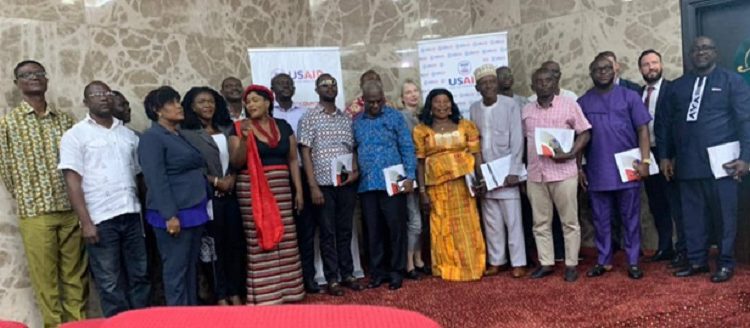CEPPS partners and guests at the launch
The Political Accountability Activity (POLA) project has been launched by the Consortium for Elections and Political Strengthening (CEPPS) partners; International Republican Institute (IRI), International Foundation for Electoral Systems (IFES) and National Democratic Institute (NDI) to enhance political accountability, foster active and diverse citizens’ engagement, and support the government to advance electoral reforms.
POLA, which is a four-year project funded by the USAID, will involve the three CEPPS partners rolling out interventions to achieve the project’s objectives.
Resident Program Director at IRI, Sunday Alao, highlighted that IRI will be responsible for improving citizen’s knowledge of the Right to Information ACT and will also use social audits and other accountability tools to hold the government accountable, as well as invest in investigative journalism and public information campaigns.
This, according to him, will allow for greater government transparency, active citizen participation in government process, and responsive governance.
Senior Election Specialist at IFES Ghana, Gilbert Sam, also stated that his organization will work with the Electoral Commission (EC), Civil Societies, and the National Commission for Civic Education (NCCE), to help in the implementation of measures to improve transparency in campaign finances, monitor the high cost of politics and advocate for reforms, as well as engage young people on political accountability issues.
Senior Program Manager for Central and West Africa at NDI, Alex Bailey, shared that her organization will aid in improving citizen observation of elections using the Parallel Vote Tabulation (PVT) methodology to assess election results.
“The PVT could be a vital tool for preventing post-election violence, informing the public about the integrity of election processes, and allowing citizen observers who reflect on the diversity of Ghana’s citizens directly participate in monitoring electoral integrity,” she shared.
Chairperson of the NCCE, Kathleen Addy, urged citizens to play their roles in democracy and be active citizens in order to make it grow.
“We know that democracy as a form of government which offers all of us the best chance for building a just society for all. This can only be achieved if we as citizens recognise our role and the part we have to play in making this dream come alive,” she cited.
Director for Training at EC, Michael Boadu, disclosed that, “As we navigate through these deformational times, it becomes increasingly crucial to advocate for more inclusive approach ensuring the voices of all citizens are heard and represented.”
He added that through the project, the EC will strengthen it advocacy efforts and engage effectively with diverse stakeholders to promote active participation of communities and underrepresented groups in the political and electoral sphere.
By Abigail Atinuke Seyram Adeyemi & Nafisatu Abdul Razak

